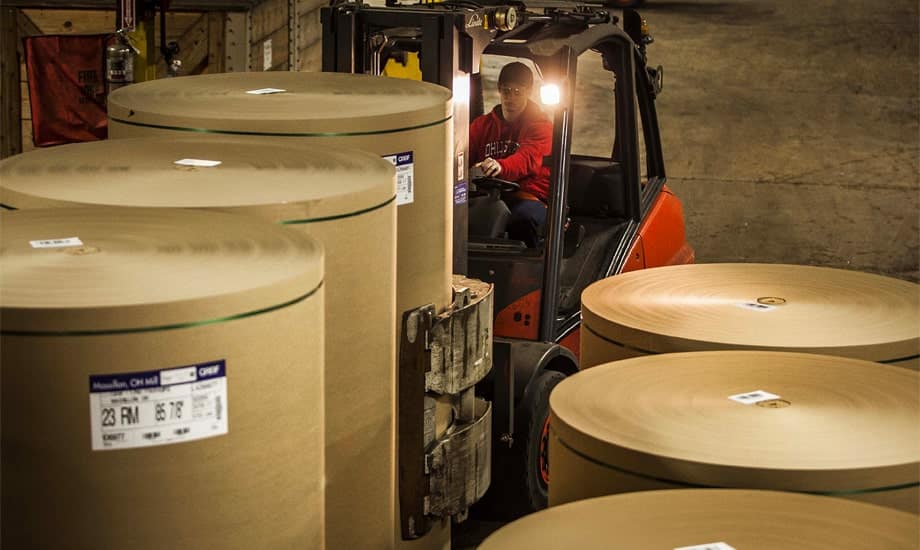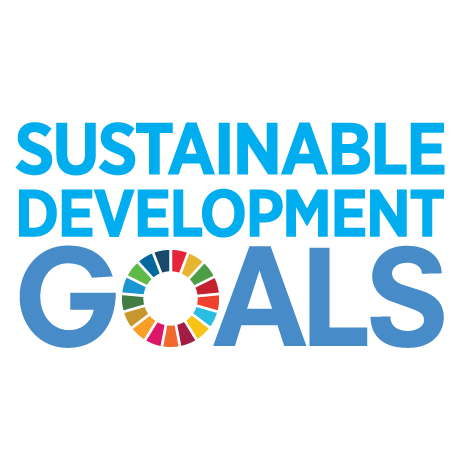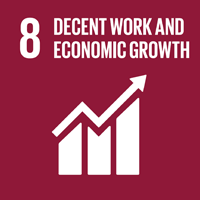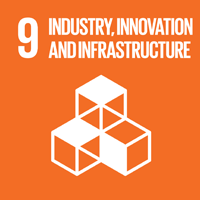Highlights
- Product quality is non-negotiable for our customers, so we work continuously to improve product quality and generate lasting improvements. Our success depends on the capacity to reliably produce high-quality, defect-free products that meet applicable specifications and fulfill customer expectations.
- Our Global Operations Group (GOG) enables us to align our product quality strategy, objectives and approaches globally in line with our Global Product Quality Policy.
- Greif Business System 2.0 expands our ability to exercise critical control points in the manufacturing process to discover and correct deviations from production specifications before a potential defect reaches a customer or impacts production.
- In 2023, we achieved a global Corrective Action Rate (CAR) of 1.05.
Why Product Quality Matters
Product quality is the cornerstone of our business, providing the foundation to achieve our mission of delivering legendary customer service and ensuring long-term success. Our commitment to the highest standards of quality ensures that we not only meet but exceed customer expectations, fostering trust and loyalty. Our dedication extends to developing safe and reliable products, protecting consumers from potential hazards and mitigating environmental impacts. Maintaining high product quality is also essential for regulatory compliance, as it ensures that products meet industry standards and adhere to regulations. We prioritize product quality across all business units, considering it a continual journey of improvement as we strive to consistently advance our standards and efforts.
Governance
The Senior Vice President of Global Operations maintains oversight of the GOG, which consists of two regional levels, North and Latin America (AMER) and Europe and the Middle East, Africa and Asia Pacific (EMEA/APAC). The GOG supports all business units and facilitates global alignment of our product quality strategy and objectives while standardizing our approach. The group also fosters cross-functional collaboration across the business, enabling teams to coordinate efforts and achieve quality goals efficiently.
We aim to uphold consistent product quality standards across all regions. In 2023, we updated our Global Product Quality Policy to help ensure uncompromised product quality standards and drive our quality management system throughout our business. This policy, aligned with our vision, purpose and Build to Last Strategy, establishes our commitment to a consistent standard and approach and outlines our processes to achieve our product quality standards and expectations for Greif colleagues.
Greif’s Top-Level Management Commitment is integral to our Quality Management Program, defining how Greif collaborates with stakeholders and maintains regulatory compliance. To address the diverse regulatory landscapes and operational contexts in our global operations, we established a dedicated team to review procedures, distinguishing between global, business unit-specific and regional considerations. Potential quality issues are reported through our integrated quality management system, Greif QS, with documented corrective procedures through appropriate channels.
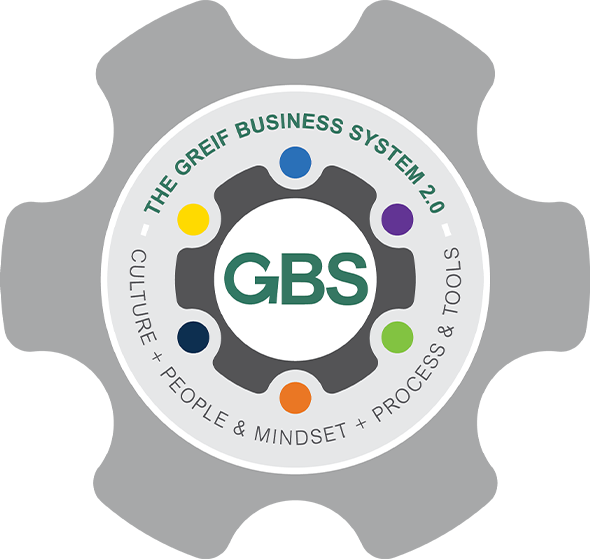
Greif Business System 2.0
Greif Business System 2.0 (GBS 2.0) strengthens our control over manufacturing processes, providing our teams tools and processes to identify and correct product deviations before they impact customers or production. The system establishes uniform methods and approaches in scale, shape and size, ensuring consistency across our organization. We continued to improve GBS 2.0 in 2023 by assessing gaps and expanding the tool’s applications. The Global Regulatory Steering Committee prioritizes improvements based on global product quality performance benefits. Integrating ERP with GBS 2.0 at the item level enhances material transparency, linking certifications from raw materials to finished goods.
Through our Quality Management System scorecard, we assess GBS 2.0 performance, generating an organizational health report, including customer complaints, internal corrective actions, management reviews and supplier evaluations. In 2023, the scorecard was expanded to track events across business processes, and we extended its usage to Latin America with plans to expand to EMEA and APAC regions next year.
We communicate quality standards throughout our production network using Greif QS. Greif QS houses a suite of applications that ensure quality and consistency in our products and processes throughout our facilities. Examples of these applications include:
- Complaint Response/Corrective Action Systems
- Internal Corrective and Preventative Action Systems
- Audit Management System
- Calibration Systems
- Supplier Management Systems
- Management Review System
- Document and Training Management Systems
We have enhanced our operational framework by refining key performance indicator metrics to include continuous monitoring of leaker counts and leaker CARs. Additionally, we introduced tools such as a global quality alert system, a second approver process for severe complaints, a troubleshooting guide and automated critical inspections to maintain product integrity. Furthermore, we initiated the pilot and reinforcement of our Visual Quality System under our Back to Basics workstream. Subsequently, we introduced 101-type training for steel, fiber and intermediate bulk containers. This foundational product manufacturing training establishes visual quality standards at critical workstations in coordination with our Visual Quality System.
The Management of Change tool within Greif QS was expanded to additional regions in 2023 and categorizes changes in raw materials, suppliers, processes and other indicators affecting product quality and safety. The tool assesses change severity, initiates a review process and communicates approved changes across Greif functions, ensuring compliance and enabling prompt customer notification. Greif QS also includes our UN certification process, helping to ensure our products meet the regulations for the transportation of hazardous materials.
Systems and procedures are in place to ensure materials used comply with various requirements including the European Union’s (EU’s) Registration, Evaluation, Authorisation and Restriction of Chemicals (REACH) regulation, Restriction of Hazardous Substances Directive (RoHS), and Commission Regulation No 20/2011 (EU20/2011); California’s Proposition List 65 (Prop 65); and various U.S. Food and Drug Administration rules. As part of this program, critical raw materials are evaluated against these requirements. This review process is integrated into our ERP system and Quality Management System applications, allowing us to have visibility to product composition and to issue product declarations. In the event non-compliant materials are used, the system will prevent the creation of a declaration for the applicable regulation or standard. Critical control plans are also created for each substrate, data from internal and external sources (such as complaints, internal corrective actions, audits findings, defect records) is analyzed for opportunities to change and modify the critical control plans.
Our Technical Information System manages product material and safety information. Before purchasing new products, colleagues refer to Safety Data Sheets and chemical databases to ensure compliance with internal and external regulations. A new application included in Greif QS is the Supplier Raw Material System, where we evaluate our raw materials and components to ensure they comply with articles and regulations that require product declarations. For example, regulatory requirements set out by the FDA or EU10/2011, also require declaring the absence of substances to assess and document potential risks related to customer health and safety. The REACH Candidate List of substances of very high concern (SVHC) list and authorized substances are monitored and appropriate measures are taken to avoid listed products. We also work to identify and introduce alternative substances. Greif extends our expertise to customers by offering Safety Data Sheets, packaging advice and information on products compatible with our packaging products, supporting responsible packaging choices. We utilize tests and research on materials for our manufacturing processes and continuously monitor industry and regulatory changes regarding compliance and product safety.
Fostering a culture of safety and accountability, our Commitment-Based Safety/Quality (CBS/Q) program encourages best practice sharing through daily dialogues about product quality and safety across our entire business. In 2022, we delivered leadership training down to the third level of management, and in 2023, we continued to expand this training. We piloted a calendar in EMEA and APAC regions of monthly topics for recorded webinars that will be made available in Greif University for future onboarding and ongoing training for applicable colleagues. In 2024, CBS/Q was expanded to office colleagues and our goal is to continue extending this initiative globally. Learn more about our CBS/Q program in our Health & Safety section.

Centralizing and Standardizing Knowledge
We piloted our Point of Contact Training within Latin America in 2023 to centralize and standardize knowledge. This initiative focuses on key individuals who frequently work with the product quality teams, such as quality specialists, managers and frontline supervisors, and provides training on their roles and responsibilities for collaboration. The program uses a proactive approach through onboarding new colleagues, providing them with a toolkit that includes a tailored plan, resources and individualized support to expedite their integration. Following the training's successful pilot, we aim to expand the program to the PPS business to ensure standardized practices and knowledge transfer within the organization.
Greif is dedicated to improving our food safety program and safeguarding consumer health. Based on the requirements of the good manufacturing practice (GMP) program, our ISO/GMP system seamlessly integrates food safety requirements into our manufacturing processes company wide. Most Global Industrial Packaging North America (GIP NA) facilities are fully compliant with these standards. We are actively expanding our food safety certification systems to align with the growing demand from customers and regulatory requirements. This includes obtaining certifications compliant with the Global Food Safety Initiative, such as FSSC 22000, Safe Quality Food (SQF) Program and the BRCGS Global Food Safety Standard. The Global Food Safety Initiative is an international effort that benchmarks and harmonizes various food safety standards, and our pursuit of GFSI-compliant certifications is in response to the rising prevalence of these standards, driven by customer requests and regulatory mandates.
Within the PPS business, all CorrChoice facilities feature comprehensive testing labs for performance testing and real-time data collection for product quality. We test raw materials to ensure consistency and share results with our suppliers. Consistent raw material performance provides a more uniform finished product. The labs facilitate collaboration with customers to assess material combinations and performance and determine optimal cost-effective product specifications. All testing facilities require certified test technicians and standardized equipment packages ensure consistent methods and procedures.
Goals, Progress & Performance
Strategic quality roadmaps within GOG support continuous improvement and identify and align initiatives with Greif’s strategic objectives and our new 2030 sustainability goals. Roadmaps are reviewed annually by GOG leadership and include detailed plans for short-term initiatives and three-year plans for focus initiatives. Initiative outcomes are a component of individual and team performance goals and help Greif improve overall performance metrics such as CAR, customer complaints and Greif’s Customer Service Index and Net Promoter Score. Our product quality efforts collectively aid in our continuous improvement of customer priority areas: product integrity, on-time delivery, contaminants and aesthetic quality.
Each manufactured item undergoes thorough evaluation for product quality, focusing on integrity and compliance with specifications. In 2023, 57 percent of Greif’s 199¹ eligible global production sites were certified to ISO 9001 standards for quality management, including 91 percent of our 122 Global Industrial Packaging production sites. We utilize customer complaint tracking and the CAR to uphold a standardized quality benchmark for our products. We provide monthly performance updates to regional presidents, vice presidents and general managers to ensure transparency and accountability. Please see our 2024 Certifications document for a full list of our quality, food safety and other certifications.
In 2023, we achieved notable milestones in advancing our strategic roadmap for product quality. The roadmap featured several initiatives across four categories: QA and Regulatory Team, Creating Value for our Customer, Eliminating Risk and Continuous Learning Organization. Key accomplishments included completing an organizational review and alignment, updating our succession plan, improving our customer complaint resolution process and assessing gaps in our GBS 2.0 tool. As we progress, we are committed to building on this progress, focusing on completing additional initiatives outlined in the roadmap for 2024 and 2025.
We are evolving our complaint resolution process, shifting our culture to view complaints as opportunities for positive transformation. We aim to gather feedback through surveys upon completion of each complaint, gauging satisfaction with our response and handling, emphasizing a customer-centric approach. As we continue these efforts in 2024, we will focus on enhancing our systems, making meaningful connections within the complaint management and corrective action processes and integrating additional information and tools to empower users within the system.
[1] As of October 31, 2023.
CORRECTIVE ACTION RATE
Real-time Quality Management
Greif’s CorrChoice facilities, part of our Paper Packaging & Services (PPS) business, have implemented a set of tools that enable us to monitor and correct for potential quality issues in real-time. The tools establish alerts for a variety of factors that may impact quality, such as temperature and material storage capacity, and correct any deviations before they fall out of specification. This ability allows us to reduce waste, track potential recurring deviations and avoid long runs of products that would not meet customer expectations. As part of our Zero Defect System, our production lines are lined with ultrasonic sensors capable of detecting any separation or variation that may occur during the manufacturing process, such as differences in caliper spacing and paper weights. The system tracks defects as they move down the production line, removing defective products and recycling scrap.
